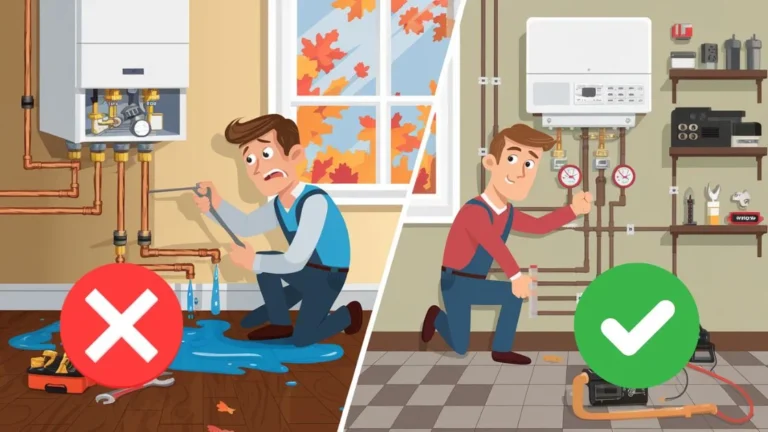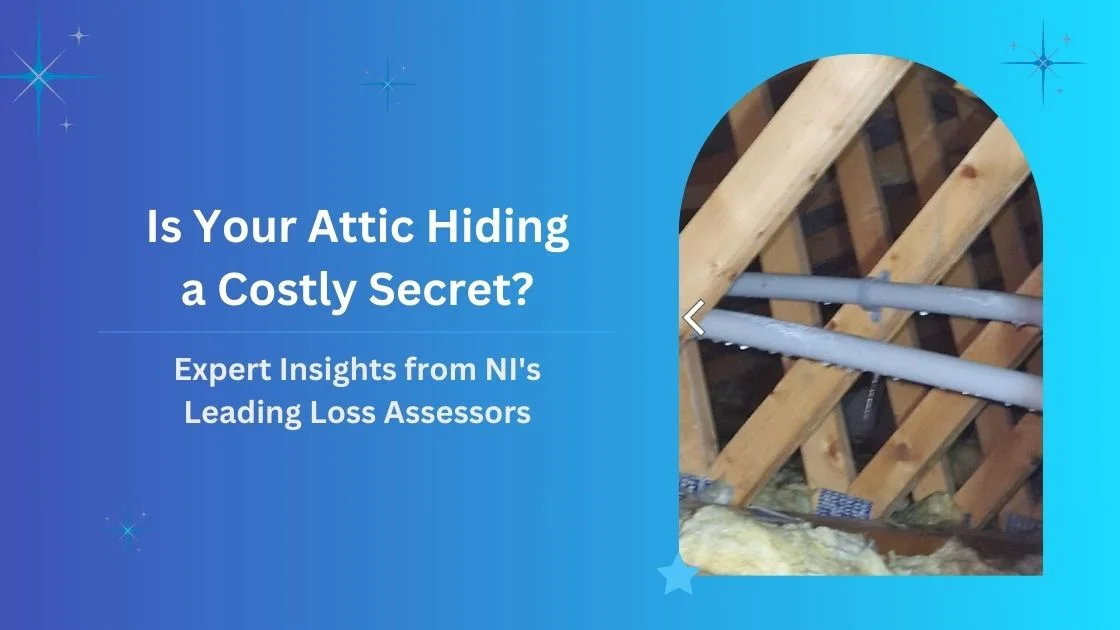Central heating leaks can cause significant inconvenience and potentially expensive repairs if not addressed promptly. Understanding how to manage these leaks is essential for maintaining an efficient heating system. In this article, we’ll provide key insights into identifying, addressing, and preventing central heating leaks in your home.
- Effectively managing central heating leaks is crucial for ensuring energy efficiency and preventing extensive damage.
- Begin by recognising key signs such as damp patches, unusual noises, and frequent pressure drops.
- Employing advanced detection techniques, like thermal imaging and acoustic methods, allows for precise leak identification.
- Regular maintenance, including annual inspections and pipe insulation, can mitigate future issues.
- Weighing DIY repairs against professional leak detection services is essential; while DIY can be cost-effective, professionals offer guarantees and comprehensive solutions.
Leak Detection Techniques
Effective leak detection techniques are essential for maintaining the integrity of central heating systems and preventing costly damage. Among the most effective methods are thermal imaging and acoustic detection.
Thermal imaging cameras can accurately identify temperature differences in piping, enabling non-invasive leak detection without the need to drain the system. Meanwhile, acoustic detection techniques amplify sounds from escaping pressurised water, allowing technicians to pinpoint leaks through sound analysis.
Other reliable methods include gas tracing, which introduces an odourless gas to detect escape points, and visual inspections for dried water marks. Applying chemical leak detection sheets can also assist in identifying small leaks in hard-to-reach areas.
Embracing these techniques fosters a proactive approach to leak management, ensuring a safe and efficient heating environment.
Signs of Central Heating Leaks
Central heating leaks can lead to significant issues if not addressed promptly, making it essential to recognise the signs early.
Vigilance in identifying these signs can save you from extensive damage and costly repairs. Here are key indicators to watch for:
Signs of Central Heating Leaks
Identify early indicators to prevent extensive damage and costly repairs.
Causes of Heating System Leaks
Understanding the causes of heating system leaks is essential for effective management and prevention.
Corrosion of pipes, poor installation practices, and the effects of freezing temperatures are significant factors that contribute to system vulnerabilities.
Addressing these issues proactively can save homeowners from costly repairs and ensure the longevity of their heating systems.
Corrosion of Pipes
The integrity of a heating system’s pipes is paramount for maintaining efficiency and preventing leaks; however, corrosion remains a prevalent threat. Prolonged exposure to water and oxygen, coupled with harmful chemical agents, accelerates rust formation, compromising the lifespan of pipes.
Older systems, particularly those constructed from iron or steel, are especially vulnerable to this degradation.
To safeguard your heating system, consider the following measures:
- Regular maintenance and inspections
- Water quality testing to identify corrosive agents
- Application of corrosion inhibitors
- Immediate attention to signs of rust or leaks
- Replacement of compromised pipes when necessary
Poor Installation Practices
Inadequate installation practices significantly contribute to the risk of leaks in heating systems, often resulting in costly repairs and inefficiencies.
Common installation errors, such as improper sealing techniques at joints and connections, create weak points susceptible to leaks. Furthermore, using incompatible materials can lead to corrosion through electrolysis, further compromising system integrity.
Insufficient support for pipes may induce stress and movement, exacerbating wear and tear that results in leaks. In addition, neglecting to pressure test the system after installation can leave undetected weak spots, while incorrectly sized components can cause excessive pressure fluctuations.
To ensure a reliable heating system, prioritising professional installation practices is essential for long-term performance and peace of mind.
Freezing Temperature Effects
As winter approaches and temperatures drop, central heating systems face heightened risks due to the effects of freezing conditions.
The water within pipes can freeze, leading to increased pressure and potential bursts, which often result in significant leaks. Ice expansion creates stress fractures, particularly in older or corroded pipes.
Inadequate pipe insulation in unheated areas, such as cellars or lofts, exacerbates this risk. Additionally, temperature monitoring is essential in preventing ice blockages that can obstruct water flow and lead to pipe failure.
- Ensure proper pipe insulation
- Regularly monitor ambient temperatures
- Inspect older pipes for corrosion
- Maintain heating systems regularly
- Address insulation in unheated spaces
Proactive measures will help safeguard your heating system against costly leaks this winter.
Cost Analysis of Leak Repairs
Effective management of central heating leaks necessitates a thorough understanding of the associated costs, which can vary widely based on the chosen repair method.
Professional leak detection services can be expensive, with total expenses potentially exceeding £1,000 depending on the complexity and detection technology used. Call PCLA today to get a free quote.
Conversely, DIY leak repairs may appear cheaper, ranging from a few pounds for sealants to several hundred for tools; however, they require skill to prevent further damage.
Investing in advanced detection methods like thermal imaging can incur higher initial costs but may ultimately save money by accurately locating leaks.
Regular maintenance checks are essential, potentially saving thousands in emergency repairs and water damage restoration, making proactive spending a wise choice.
DIY Vs. Professional Leak Solutions
When considering leak solutions, the choice between DIY methods and professional services hinges on cost-effectiveness and the expertise required.
While DIY approaches may appear economical, they often lack the advanced tools and knowledge necessary to tackle complex leaks, potentially resulting in more significant expenses in the long run.
In contrast, professional services not only guarantee accurate detection but also provide warranties that protect your investment in repairs.
Cost-Effectiveness of Solutions
Many homeowners face the dilemma of choosing between DIY methods and professional services for managing central heating leaks, each with its own set of advantages and drawbacks.
While DIY solutions may seem appealing due to lower upfront costs, they often fall short in precision and may lead to larger issues down the line, impacting long-term savings.
Consider the following:
- Professional services can access specialised tools for accurate leak detection.
- DIY methods risk overlooking significant problems, leading to higher future repair costs.
- Initial expenses for professionals can prevent costly damages later on.
- Professional plumbing includes warranties that guarantee peace of mind.
- A thorough evaluation by experts provides a comprehensive solution.
Ultimately, the cost comparison favours professional services when considering the long-term benefits.
Expertise and Tools Required
How can homeowners ensure they are adequately equipped to handle central heating leaks?
While DIY methods such as visual inspections and pressure checks may initially appear cost-effective, they often lack the precision of specialised equipment used by professionals.
Advanced technologies like thermal imaging cameras and tracer gas techniques enable experts to swiftly and accurately locate leaks, minimising disruption to your home.
Although DIY solutions might save money in the short term, they can lead to costly repairs if leaks go undetected.
Professionals have both the expert training and tools necessary to effectively address complex or hidden leaks.
Maintenance for Leak Prevention
What steps can homeowners take to ensure the longevity and efficiency of their central heating systems while minimising the risk of leaks? Implementing preventive maintenance and scheduling regular inspections are crucial. Here are essential measures to consider:
- Conduct annual inspections by qualified heating engineers to identify potential leaks early.
- Monitor boiler pressure and inspect radiator connections regularly for weak points.
- Bleed radiators periodically to eliminate trapped air and enhance system efficiency.
- Keep detailed records of repairs and performance to track issues over time.
- Insulate pipes in colder areas to prevent freezing and reduce the risk of burst pipes.
Impact of Leaks on Efficiency
Effective maintenance practices not only help prevent leaks but also play a pivotal role in maintaining the overall efficiency of central heating systems.
Leaks can drastically undermine energy efficiency, with studies revealing that even a minor leak may lead to energy losses exceeding 20%. A notable drop in boiler pressure, indicative of a leak, reduces heating performance and can increase energy consumption by 15%. Check out these urgent boiler repair signs.
This not only impacts temperature regulation but also results in higher heating bills, costing homeowners hundreds of pounds annually. Furthermore, uneven heating due to leaks creates discomfort within the home, compounding energy waste.
Eco-Friendly Heating Solutions
The shift to eco-friendly heating solutions marks a significant advancement in sustainable home energy practices. By embracing renewable technologies such as biomass boilers and heat pumps, homeowners can drastically reduce their carbon footprints while enjoying substantial savings on energy bills—up to 50%.
Solar thermal systems harness the power of the sun to provide hot water, fostering energy independence and reducing reliance on fossil fuels.
Consider these compelling benefits of eco-friendly heating solutions:
- Significant reduction in energy bills
- High heating efficiency (up to 300% for heat pumps)
- Improved indoor air quality
- Government incentives for installation
- Contribution to a sustainable future
Adopting these sustainable heating methods not only enhances comfort but also aligns with a collective commitment to environmental stewardship.
Key Takeaways
- Regularly conduct system checks and maintenance to detect leaks early and ensure the efficient operation of central heating systems.
- Use advanced leak detection techniques such as thermal imaging and acoustic detection for accurate identification of issues.
- Monitor water pressure and inspect for damp patches or unusual noises, as these may indicate potential leaks.
- Address corrosion and poor installation practices promptly to prevent leaks from developing in the heating system.
- Consider professional inspections and repairs to ensure comprehensive solutions and prevent future damage.
Protect Your Home from Hidden Water Damage—Schedule Your Leak Detection Today!
Hidden leaks can silently wreak havoc on your home’s structure and your family’s health. Don’t let a minor issue turn into a costly disaster.
Our expert team at Northern Ireland Leak Detection uses state-of-the-art technology to locate and fix leaks with minimal disruption.
Why Choose Us?
- Trusted Professionals: With years of experience, we’re Northern Ireland’s go-to experts for reliable leak detection.
- Transparent Pricing: No hidden fees—just honest, upfront quotes.
- Peace of Mind: Prevent costly repairs and maintain the value of your property.
Take the First Step Towards a Safer Home
Time is of the essence. The longer a leak goes undetected, the more damage it can cause. Contact us now to schedule your leak assessment, and let us help you safeguard your home.



